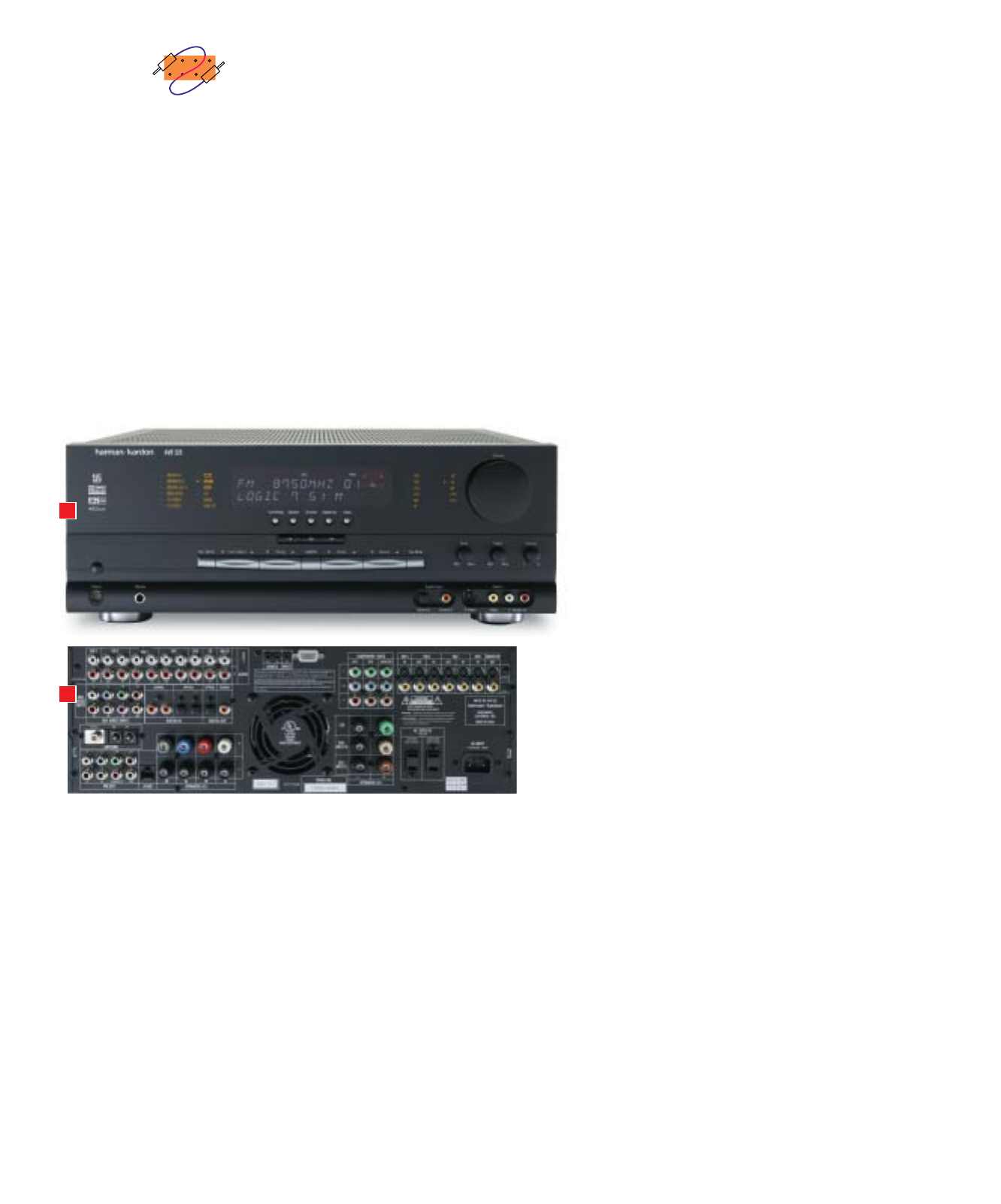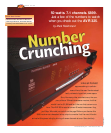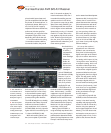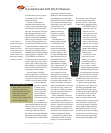
54
Home Theater/
June 2003 •
www.hometheatermag.com
Harman/Kardon AVR 325 A/V Receiver
GEAR GUIDE
that 5.1 channels are plenty for
most home theaters. Still, even I
must admit that adding two rear
speakers to the mix will allow
your system to cover a large, wide
space more evenly. Besides, you
could always trade the extra chan-
nels for higher volume and better
dynamics by running a 7.1-channel
model in 5.1 mode, without the
rear speakers. My favorite number
is 5.2. Please forgive the digres-
sion, but, once you’ve heard your
system with two subwoofers, you’ll
never want to go back.
Not afraid of the
merry-go-round
of fashion, I
connected the
AVR 325 to
seven Paradigm
Reference
Studio/20
speakers, as
well as to two
subwoofers:
Paradigm’s
12-inch PW-2200 and
Pinnacle’s 8-inch Baby
Boomer. If you’re
keeping score, that
adds up to 7.2 chan-
nels, and I pulled a
few Dolby EX and
DTS ES titles off of
the shelf to take full advantage of
them. Unfortunately, I couldn’t
supplement my own discs with
anything current from Blockbuster.
Whether the EX and ES formats
aren’t penetrating quickly, EX- and
ES-encoded titles aren’t properly
labeled, or luck just ran against
me that day, I don’t know.
Setting up the AVR 325 in a
rough-and-ready way doesn’t take
long, thanks to Harman/Kardon’s
patented and trademarked EzSet
system (the legal department must
have put in almost as many hours
as the research-and-development
department did). At the tip of the
remote, there’s a small micro-
phone that senses the customary
pink-noise test tones and sends
level-setting commands back to
the receiver, which means that
you can get along without an
SPL meter, although it wouldn’t
hurt to use a meter to double-
check and fine-tune. You might
find, as I did, that EzSet and
your meter come up with slightly
different settings.
As I set up the receiver, I
tripped over one of Harman/
Kardon’s user conveniences.
Every time I tried to assign the
digital coax-2 jack to the video-2
input, the receiver switched to
the analog audio inputs. At first,
I thought the menu was failing
to accept the setting, but it turns
out that the video-2 input has a
unique logic circuit that switches
to coax-2 when a digital signal is
present and defaults to the ana-
log jacks when there’s no digital
signal. This will come in handy
with certain HDTV cable boxes
that output digital audio for
some channels and analog audio
for others. (Until recently, I had
such a box, but I’ve upgraded to
one that feeds both digital and
analog soundtracks through
the coax outputs.)
I only had one gripe with the
AVR 325, and that concerned its
remote. It has both learning
capability and preprogrammed
codes, but, with all of those tiny
buttons, using it to operate an
entire system would be a mixed
blessing. The OSD button that
activates the onscreen menu is
especially hard to find. On the
positive side, Harman/Kardon
priced models’ spec sheets, and
you’d be surprised to find how often
the phrase “all channels driven” is
mysteriously absent. While you’re
at it, look for the full frequency
response of 20 hertz to 20 kilohertz,
as Harman/Kardon specifies.
Occasionally, you might find a few
competitors slip by with a less-
demanding 40 Hz at the low end.
If I could condense everything
I know about receivers down to
four words of advice, they would
be these: Buy by the pound. A
heavier black box is more likely
to house a beefier power supply,
and that suggests greater dynamic
prowess, among other benefits.
The AVR 325 weighs in at a healthy
40 pounds; that’s about 13 pounds
heavier than Harman/Kardon’s
next model down, the 5.1-channel
AVR 225 ($549), and only 4 pounds
lighter than the next model up, the
7.1-channel AVR 525 ($1,199).
While we’re talking about num-
bers, let me repeat my conviction
A. The AVR 325 is
a surround lover’s
receiver, offering
Dolby EX, DTS ES,
Dolby Pro Logic II,
and LOGIC7.
B. The back panel
sports two compo-
nent video inputs,
an eight-channel
analog audio input,
an RS-232 port, and
assignable rear-
channel amps.
A
B






